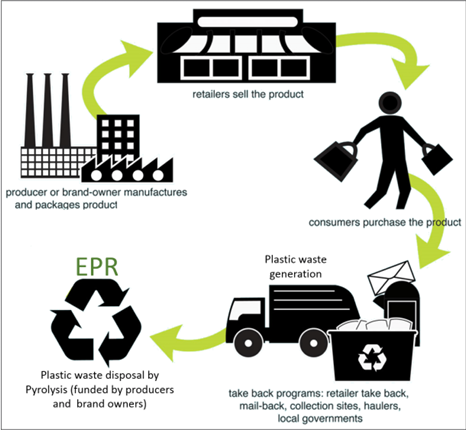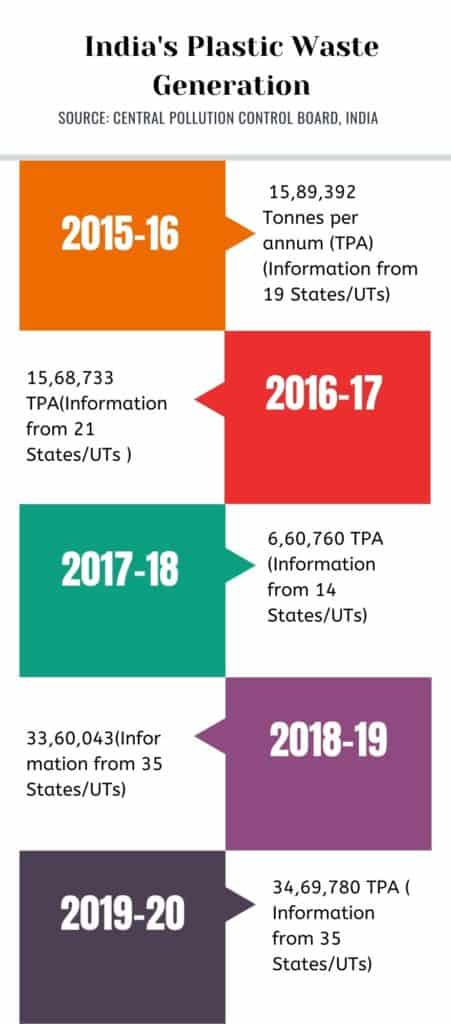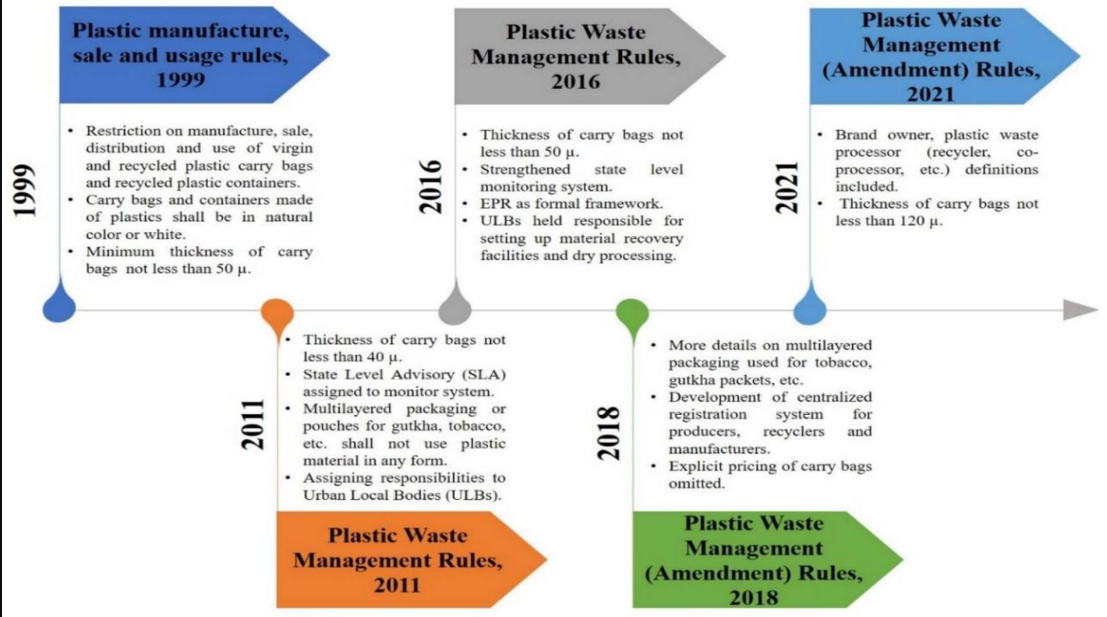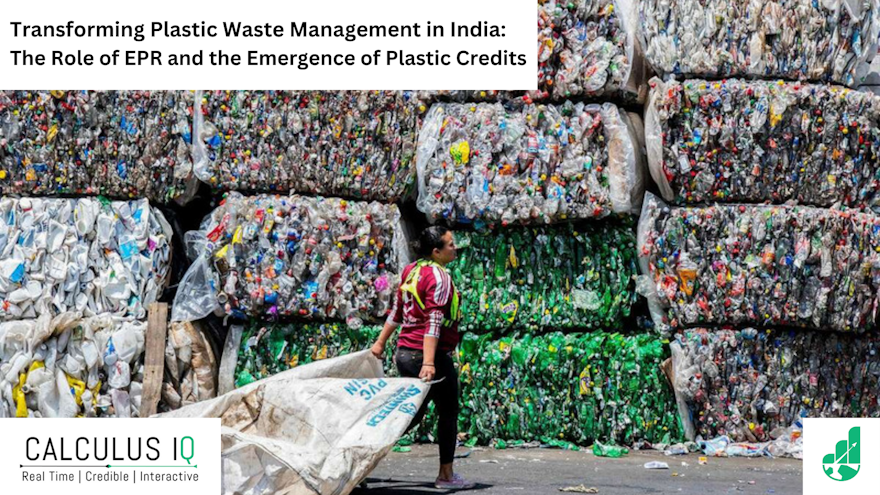Introduction
India's commitment to effective waste management and sustainable practices has led to the implementation of Extended Producer Responsibility (EPR) policies. EPR places the responsibility of waste management on producers, importers, and brand owners, aiming to shift the burden from the government to the private sector.
With the introduction of EPR guidelines for e-waste and plastic packaging, India is making significant strides in waste reduction, recycling, and promoting a circular economy. This article explores the impact of EPR in India, its current status, and its future prospects.
Extended Producer Responsibility
Extended Producer Responsibility (EPR) is a comprehensive strategy that extends a producer's accountability beyond the manufacturing stage and encompasses the entire lifecycle of a product. Its objective is to encourage producers to develop environmentally conscious products, minimize waste generation, and support recycling and re-utilization efforts.

The implementation of Extended Producer Responsibility (EPR) in India was imperative due to the persistent rise in plastic waste generation over the years. To illustrate the gravity of the situation, please refer to the following infographic:

In India, EPR redefines the allocation of physical and financial responsibility by shifting a portion of the waste management burden from municipalities to the producers. This approach mandates that producers assume responsibility for the end-of-life management of their products and packaging, encompassing collection, transportation, recycling, and disposal processes.
By implementing this policy, India aims to foster a sustainable and circular economy, guided by the principle that producers should bear the costs associated with managing their products and packaging, rather than burdening taxpayers or harming the environment.
Roles and Responsibilities of Stakeholders in EPR Implementation in India
Central Pollution Control Board (CPCB)
- Establishes waste management guidelines and standards
- Facilitates stakeholder collaboration and provides action plans for each stakeholder
- Conducts stakeholder consultations to address challenges
- Monitors EPR implementation in coordination with State Pollution Control Boards (SPCBs)
- Verifies and researches EPR reports for national-level reporting
State Pollution Control Board (SPCB)
- Monitors state-level actions per the Plastic Waste Management regulations
- Ensures stakeholders comply with CPCB guidelines through regular inspections
- Grants authorizations to processors, brand owners, and co-processors
- Relays information, notifications, and guidelines from CPCB to stakeholders
Producers (PIBOs - Producers, Importers, and Brand Owners)
- Register with State Pollution Control Board and provide accurate information about plastic consumption
- Establish mechanisms for plastic waste collection and disposal
- Maintain communication with CPCB/SPCBs and participate in stakeholder discussions
- Work with Urban Local Bodies (ULBs) for efficient waste collection
- Set up infrastructure for plastic waste segregation, collection, storage, and disposal
EPR Agency
- Act on behalf of PIBOs to carry out EPR activities
- Identify plastic waste sources and sign contracts for waste collection
- Identify authorized recyclers/processors and enter into agreements for proper disposal
- Maintain records of purchase bills, weight receipts, and disposal documents
- Submit compliance reports and required documentation to PIBOs
Recyclers and Co-Processors
- Obtain valid operating permits and adhere to handling standards and pollution control norms
- Register with Pollution Control Boards and local governments
- Communicate with PCBs about involvement in EPR activities and plastic processing details
- Process plastic waste on behalf of clients and maintain records
Local Body
- Design and build infrastructure for plastic waste management in collaboration with producers.
- Establish and coordinate waste management systems
- Ensure proper segregation, collection, storage, transportation, and disposal of plastic waste.
- Channelize recyclable plastic waste to recycling centers.
- Raise awareness among stakeholders.
Impact of EPR in India
India's EPR policy has brought about transformative changes in waste management and sustainability practices. By holding producers accountable for the entire lifecycle of their products, EPR has encouraged responsible waste disposal, recycling, and resource recovery. The policy has helped create a more sustainable and eco-friendly approach to waste management in the country.
The implementation of EPR for electronic equipment and plastic packaging has had a significant impact. Producers, importers, and brand owners are now required to obtain EPR authorization and adhere to specific targets for waste collection and recycling.
Currently, the Centralized Online Extended Producer Responsibility (EPR) Portal on Plastic Packaging boasts an impressive registration count of 6186 Producers, Importers, and Brand Owners.
These registered entities collectively account for approximately 2.32 Million Tons of plastic packaging that falls under the purview of Extended Producer Responsibility for the year 2022-23, encompassing even packaging used for food products. Additionally, the EPR portal hosts 1715 registered plastic waste processors, with a combined capacity to process an astounding 17 million tonnes of plastic waste annually.
This has led to an increase in the collection and proper disposal of e-waste and plastic packaging, reducing environmental pollution and promoting resource conservation.
EPR has also fostered the growth of the waste management industry, with e-waste and plastic waste processors and recyclers transforming waste management into a profitable business opportunity. This has not only contributed to waste reduction but has also created employment opportunities and stimulated economic growth.
Evolution of EPR Guidelines in India
The implementation of Extended Producer Responsibility (EPR) in India has seen significant progress through the introduction of guidelines and rules for managing plastic waste and e-waste. The journey of EPR guidelines in India can be traced back to the E-Waste (Management and Handling) Rules, 2011, which marked the initial step in addressing producer responsibility.

Further developments took place when the Ministry of Environment, Forest and Climate Change (MoEF&CC) notified the EPR guidelines as part of the Fourth Amendment to the Plastic Waste Management Rules in 2016. These guidelines focused on plastic waste and aimed to establish a framework for producers to take responsibility for the entire lifecycle of their products, including collection, recycling, and disposal. Building on these efforts, the MoEF&CC recently issued guidelines on Extended Producer Responsibility for Plastic Packaging through the Plastic Waste Amendment Rules in 2022. These guidelines introduced EPR authorization requirements specifically for plastic packaging and outlined collection targets for different categories of plastic packaging.
In the case of e-waste, the guidelines for Producer Responsibility Organizations (PROs) managing EPR obligations were defined in the E-Waste Management Rules of 2016. Subsequently, an amendment was made to these rules in 2018, revising the collection targets for e-waste by the Producers. These guidelines established the producer's responsibility to manage the entire lifecycle of the product, including collection, recycling, and disposal of e-waste.
Under the EPR policy in India, both for plastic waste and e-waste, producers (PIBOs) are required to obtain EPR authorization from the Central Pollution Control Board (CPCB). PIBOs also have the option to fulfill their EPR targets through authorized Producer Responsibility Organizations (PROs).
With each update and amendment, the EPR guidelines in India have expanded and become more comprehensive, addressing the specific challenges associated with plastic waste and e-waste management. These guidelines reflect the government's commitment to promoting responsible producer behavior and ensuring sustainable waste management practices throughout the product lifecycle.
Challenges
While Extended Producer Responsibility (EPR) has brought about positive changes in waste management practices, there are still challenges that need to be addressed. One of the major challenges is meeting the increased EPR targets for plastic packaging. Producers, importers, and brand owners may face difficulties in achieving these targets, especially considering the scale of plastic waste generated in India. The targets set by the Ministry of Environment, Forest and Climate Change require a significant increase in recycling rates and the use of recycled content in plastic packaging. Challenges Faced in EPR Implementation in India:
- Lack of understanding and compliance with EPR rules by organizations.
- Lengthy and complex documentation process.
- Insufficient waste management infrastructure and limited large-scale technologies.
- Difficulty in tracking the EPR process when partnering with Producers Responsibility Organizations (PROs).
To overcome these challenges, expert guidance and support from organizations well-versed in waste management, such as Enterclimate, become essential. These organizations can provide the necessary knowledge and expertise to help businesses meet their EPR obligations effectively. They can offer guidance on waste collection, recycling processes, and the development of sustainable packaging solutions. By partnering with such organizations, producers, importers, and brand owners can navigate the complexities of waste management and work towards achieving their EPR targets.
It is also crucial to streamline the authorization process and provide comprehensive guidelines to facilitate easier compliance. Clear and accessible guidelines will help businesses understand their responsibilities, the steps they need to take, and the timelines for meeting their EPR targets. This can ensure widespread compliance and encourage more businesses to participate in responsible waste management practices.
EPR Regulations
The Ministry of Environment, Forest, and Climate Change has taken a proactive approach to shaping the future of EPR in India. They have notified the Guidelines on Extended Producer Responsibility for plastic packaging on February 16, 2022. These guidelines introduce mandatory targets for producers, importers, and brand owners in terms of reuse, recycling, and the use of recycled content in plastic packaging.
The targets set for the minimum level of recycling of plastic waste across different categories of plastic packaging are progressive and aim to strengthen the circular economy of plastic packaging waste.
The set year-wise targets are shown in the table below,

In the case of compostable plastic packaging, the target is set at 100% from 2023-24.
To support the development of recycling infrastructure for plastic waste, the Ministry of Micro, Small and Medium Enterprises and the Department of Chemicals and Petrochemicals, Government of India, offer schemes that provide technical and financial assistance. These schemes aim to encourage the establishment of recycling facilities and promote innovation in waste management technologies.
By setting clear targets and providing assistance through schemes, the government is paving the way for a more sustainable future in waste management. The enforcement of these regulations will contribute to the circular economy of plastic packaging waste and drive the development of recycling infrastructure.
Future of EPR in India
The future of EPR in India is promising, with continued efforts to enhance waste management practices and promote sustainability. The recently notified EPR guidelines for plastic packaging have set clear targets for producers, importers, and brand owners to increase recycling, reuse, and the use of recycled content in their packaging.
To further strengthen the circular economy and develop recycling infrastructure, the Ministry of Micro, Small, and Medium Enterprises and the Department of Chemicals and Petrochemicals offers technical and financial assistance. These initiatives aim to support the establishment of recycling facilities and promote innovation in waste management technologies.
As the EPR targets gradually increase, there is a need for collaboration between stakeholders, including producers, waste processors, and regulatory bodies, to ensure effective implementation. Public awareness campaigns and capacity-building programs can also play a crucial role in encouraging responsible waste management practices and promoting consumer participation.
EPR & Plastic Credits
To complement the efforts of EPR, the concept of plastic credits has emerged as a market-based mechanism to incentivize and finance the reduction and removal of plastic waste from the environment. Similar to carbon credits, plastic credits allow organizations to offset their plastic waste footprint by purchasing credits from projects that remove or reduce plastic waste. These projects can include waste collection and recycling programs, beach clean-ups, and initiatives promoting sustainable practices.
Plastic credits offer a valuable opportunity to kickstart EPR programs and support waste reduction initiatives. They provide a means for companies to invest in successful waste reduction projects and contribute to broader social and environmental goals. By utilizing plastic credits, companies can offset their plastic waste footprint and support projects focused on collecting and recycling plastic waste, reducing their negative environmental impact.
Low-value plastic, which poses significant environmental degradation challenges, necessitates the establishment of a reliable ecosystem that fosters collaboration between offset providers and local organizations for effective waste management. The implementation of plastic credits ensures that all plastic products are recyclable, thereby contributing to sustainable practices.
In a plastic Extended Producer Responsibility (EPR) model, two key stakeholders play vital roles. The first comprises organizations that utilize plastic in their product manufacturing and packaging, while the second involves projects that collect plastic waste from the environment and recycle it into new products. EPR companies take on the responsibility of recycling an equivalent amount of plastic waste they generate, thereby minimizing landfill accumulation. Plastic credit certificates are issued to acknowledge the credits earned based on the quantity of plastic waste successfully recycled.
The Future of Plastic Credits in India
Plastic credits have the potential to support the implementation of waste reduction commitments and obligations in the longer term. They can help mitigate uncontrollable plastic leakage from a company's value chain and catalyze investment in new waste recycling and collection efforts. Plastic credits, when integrated with EPR frameworks, can streamline the transfer of resources from obligated companies to projects focused on waste management, reducing the administrative burden on the government.
India is emerging as a dominant force in the global plastic credit landscape, capturing a remarkable 88.4% share with an impressive count of 523,000 credits from pipeline projects at Verra. This significant achievement showcases India's proactive approach toward addressing plastic pollution and promoting sustainable practices. To get more details on this read our article. However, it is important to note that plastic credits should not be seen as a substitute for waste reduction and recycling efforts. Companies must prioritize waste reduction and recycling before relying on offsetting. The focus should be on implementing comprehensive waste management strategies and promoting sustainable practices to minimize plastic waste generation.
Conclusion
India's EPR policy has revolutionized waste management practices, shifting the responsibility from the government to producers, importers, and brand owners. The policy has had a positive impact on reducing pollution, increasing recycling rates, and fostering the growth of the waste management industry. The future of EPR in India looks promising, with stringent targets set for plastic packaging and initiatives to develop recycling infrastructure.
In conjunction with EPR, the rise of plastic credits offers an additional avenue to incentivize and finance waste reduction projects. By offsetting their plastic waste footprint, companies can contribute to the removal and reduction of plastic waste from the environment. However, it is crucial to prioritize waste reduction and recycling efforts before relying solely on offsetting mechanisms.
To achieve sustainable waste management goals, a collaboration between stakeholders, public awareness campaigns, and streamlined compliance procedures are essential. By embracing EPR and exploring innovative approaches like plastic credits, India can pave the way for a greener and more environmentally conscious future.
![[object Object]](/lib_ubcXiSgTRmkLVyyT/k8w528b9mk1p20to.png?w=400)
